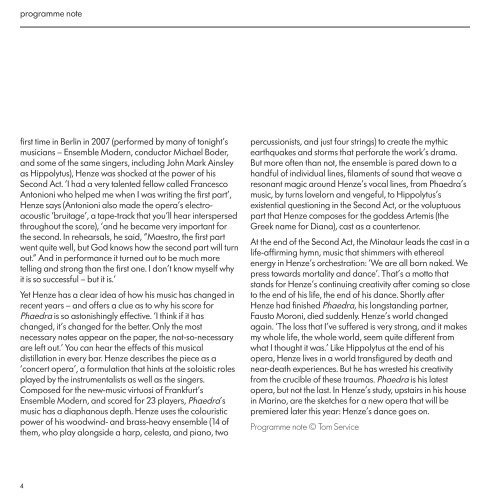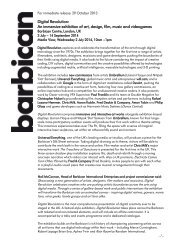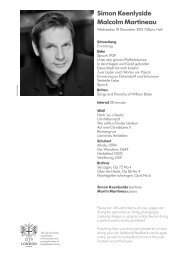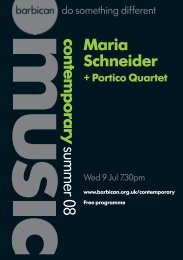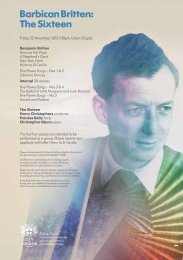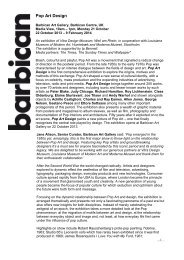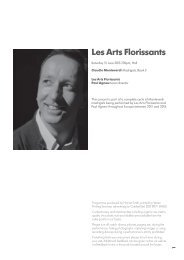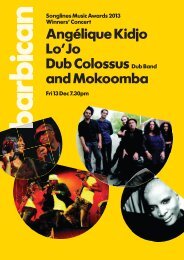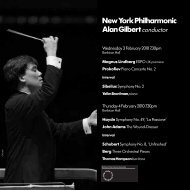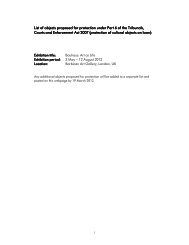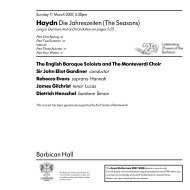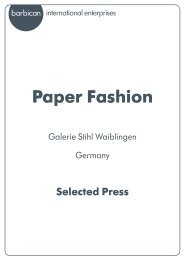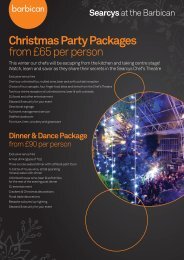Hans Werner Henze Phaedra - Barbican
Hans Werner Henze Phaedra - Barbican
Hans Werner Henze Phaedra - Barbican
Create successful ePaper yourself
Turn your PDF publications into a flip-book with our unique Google optimized e-Paper software.
programme note<br />
first time in Berlin in 2007 (performed by many of tonight’s<br />
musicians – Ensemble Modern, conductor Michael Boder,<br />
and some of the same singers, including John Mark Ainsley<br />
as Hippolytus), <strong>Henze</strong> was shocked at the power of his<br />
Second Act. ‘I had a very talented fellow called Francesco<br />
Antonioni who helped me when I was writing the first part’,<br />
<strong>Henze</strong> says (Antonioni also made the opera’s electroacoustic<br />
‘bruitage’, a tape-track that you’ll hear interspersed<br />
throughout the score), ‘and he became very important for<br />
the second. In rehearsals, he said, “Maestro, the first part<br />
went quite well, but God knows how the second part will turn<br />
out.” And in performance it turned out to be much more<br />
telling and strong than the first one. I don’t know myself why<br />
it is so successful – but it is.’<br />
Yet <strong>Henze</strong> has a clear idea of how his music has changed in<br />
recent years – and offers a clue as to why his score for<br />
<strong>Phaedra</strong> is so astonishingly effective. ‘I think if it has<br />
changed, it’s changed for the better. Only the most<br />
necessary notes appear on the paper, the not-so-necessary<br />
are left out.’ You can hear the effects of this musical<br />
distillation in every bar. <strong>Henze</strong> describes the piece as a<br />
‘concert opera’, a formulation that hints at the soloistic roles<br />
played by the instrumentalists as well as the singers.<br />
Composed for the new-music virtuosi of Frankfurt’s<br />
Ensemble Modern, and scored for 23 players, <strong>Phaedra</strong>’s<br />
music has a diaphanous depth. <strong>Henze</strong> uses the colouristic<br />
power of his woodwind- and brass-heavy ensemble (14 of<br />
them, who play alongside a harp, celesta, and piano, two<br />
4<br />
percussionists, and just four strings) to create the mythic<br />
earthquakes and storms that perforate the work’s drama.<br />
But more often than not, the ensemble is pared down to a<br />
handful of individual lines, filaments of sound that weave a<br />
resonant magic around <strong>Henze</strong>’s vocal lines, from <strong>Phaedra</strong>’s<br />
music, by turns lovelorn and vengeful, to Hippolytus’s<br />
existential questioning in the Second Act, or the voluptuous<br />
part that <strong>Henze</strong> composes for the goddess Artemis (the<br />
Greek name for Diana), cast as a countertenor.<br />
At the end of the Second Act, the Minotaur leads the cast in a<br />
life-affirming hymn, music that shimmers with ethereal<br />
energy in <strong>Henze</strong>’s orchestration: ‘We are all born naked. We<br />
press towards mortality and dance’. That’s a motto that<br />
stands for <strong>Henze</strong>’s continuing creativity after coming so close<br />
to the end of his life, the end of his dance. Shortly after<br />
<strong>Henze</strong> had finished <strong>Phaedra</strong>, his longstanding partner,<br />
Fausto Moroni, died suddenly. <strong>Henze</strong>’s world changed<br />
again. ‘The loss that I’ve suffered is very strong, and it makes<br />
my whole life, the whole world, seem quite different from<br />
what I thought it was.’ Like Hippolytus at the end of his<br />
opera, <strong>Henze</strong> lives in a world transfigured by death and<br />
near-death experiences. But he has wrested his creativity<br />
from the crucible of these traumas. <strong>Phaedra</strong> is his latest<br />
opera, but not the last. In <strong>Henze</strong>’s study, upstairs in his house<br />
in Marino, are the sketches for a new opera that will be<br />
premiered later this year: <strong>Henze</strong>’s dance goes on.<br />
Programme note © Tom Service


